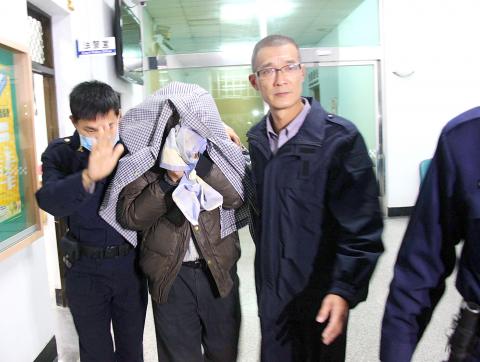The Taiwan High Court yesterday acquitted former judge Lin Te-sheng (林德盛), 63, reversing a guilty conviction handed to him for bribery in a 2005 narcotics case.
Lin was a judge at the Hualien Branch of the Taiwan High Court in 2005, when he was accused of taking bribes totaling NT$1.7 million (US$56,704 at the current exchange rate) in exchange for granting bail to a suspect surnamed Lee (李), who was being investigated for possessing heroin and other illegal drugs.
In the first ruling, the Hualien District Court convicted Lin of contravening the Anti-Corruption Act (貪污治罪條例) and handed him a 13-year prison term, which Lin appealed.

Photo: Lin Hsin-han, Taipei Times
The High Court cited uncertainties in the witnesses’ testimony and a lack of concrete evidence as reasons for acquitting Lin.
It said Lin’s earlier conviction was mostly based on testimony given by the suspect’s wife, as well as two witnesses, surnamed Ho (何) and Chien (簡), who allegedly handed the bribe money over to Lin in 2005.
Ho was wanted on a separate criminal case, but fled to China to evade prosecution, and only returned to Taiwan in 2013.
The High Court questioned the reliability of Ho’s statement, as he had difficulty recalling details that had happened eight years ago.
The court added that it was uncertain whether Lin had solicited the bribe, or whether Ho had approached him.
Prosecutors can still file an appeal with the Supreme Court.
Lin has previous convictions. The High Court last year found him guilty of corruption and sentenced him to 10 years and six months in prison for a 2005 drug trafficking case involving a man surnamed Tseng (曾).
An investigation found that Lin, who was presiding over the case, had taken a bribe from Tseng’s wife and acquitted Tseng, reversing the 20-year sentence handed to him by a lower court.
In September last year, Lin was convicted of leaking confidential information from a prosecution case he had presided over, and had to serve a one-year sentence.

The disruption of 941 flights in and out of Taiwan due to China’s large-scale military exercises was no accident, but rather the result of a “quasi-blockade” used to simulate creating the air and sea routes needed for an amphibious landing, a military expert said. The disruptions occurred on Tuesday and lasted about 10 hours as China conducted live-fire drills in the Taiwan Strait. The Civil Aviation Administration (CAA) said the exercises affected 857 international flights and 84 domestic flights, affecting more than 100,000 travelers. Su Tzu-yun (蘇紫雲), a research fellow at the government-sponsored Institute for National Defense and Security Research, said the air

Taiwan is to commence mass production of the Tien Kung (天弓, “Sky Bow”) III, IV and V missiles by the second quarter of this year if the legislature approves the government’s NT$1.25 trillion (US$39.78 billion) special defense budget, an official said yesterday. Commenting on condition of anonymity, a defense official with knowledge of the matter said that the advanced systems are expected to provide crucial capabilities against ballistic and cruise missiles for the proposed “T-Dome,” an advanced, multi-layered air defense network. The Tien Kung III is an air defense missile with a maximum interception altitude of 35km. The Tien Kung IV and V

Trips for more than 100,000 international and domestic air travelers could be disrupted as China launches a military exercise around Taiwan today, Taiwan’s Civil Aviation Administration (CAA) said yesterday. The exercise could affect nearly 900 flights scheduled to enter the Taipei Flight Information Region (FIR) during the exercise window, it added. A notice issued by the Chinese Civil Aviation Administration showed there would be seven temporary zones around the Taiwan Strait which would be used for live-fire exercises, lasting from 8am to 6pm today. All aircraft are prohibited from entering during exercise, it says. Taipei FIR has 14 international air routes and

Taiwan lacks effective and cost-efficient armaments to intercept rockets, making the planned “T-Dome” interception system necessary, two experts said on Tuesday. The concerns were raised after China’s military fired two waves of rockets during live-fire drills around Taiwan on Tuesday, part of two-day exercises code-named “Justice Mission 2025.” The first wave involved 17 rockets launched at 9am from Pingtan in China’s Fujian Province, according to Lieutenant General Hsieh Jih-sheng (謝日升) of the Office of the Deputy Chief of the General Staff for Intelligence at the Ministry of National Defense. Those rockets landed 70 nautical miles (129.6km) northeast of Keelung without flying over Taiwan,